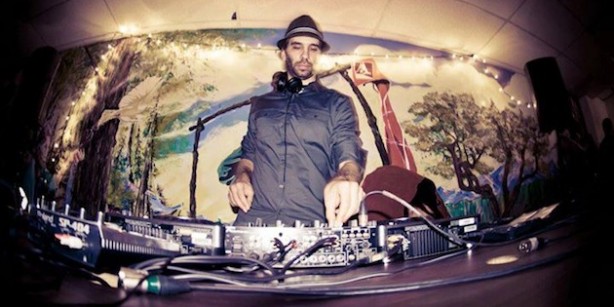 Music
Music
Quebec's independent artists go grassroots with online music distribution
by Jean-Étienne Sheehy
January 9, 2014
Montreal DJ Ghislain Poirier finished off a prolific 2013 with a tour across India and the United Kingdom, but the producer was in no position to celebrate when he received his first paycheque from music streaming service Spotify.
“Eighty-four plays on Spotify US for $0.31,” Poirier tweeted in late November. “Some say streaming is the future. Well, I’m not sure of that.”
While Poirier is one of the biggest names in Quebec’s booming electronic music scene, he is also one of the loudest voices for artists’ rights.
“Music streaming is relatively new,” said Poirier in an interview in French. “I knew the earnings from Spotify were minimal but the music industry’s in constant evolution and I don’t know where it’s headed.”
***
In 2011, Misteur Valaire played the Montreal International Jazz Festival in front of a crowd of 100,000, an impressive feat for an instrumental electro-jazz band that gained notoriety by distributing their albums online in exchange for donations.
“The record industry is slowly becoming the music industry again,” says Misteur Valaire’s Luis Clavis. “Instead of fighting to sell albums and force people into buying products within this outdated model, we decided to adapt ourselves and encourage people to get our music, but at their convenience.”
Misteur Valaire wants to ease the access to the band by eliminating everyone who stands between themselves and their fans. This year, they launched Ghoster, a subscription-based model.
“Ghoster keeps us in touch with people who help us in a monetary way. In exchange for $3 or $9 a month, we give our fans exclusive content and access to events. It’s a constant conversation, without the middleman, between us and people who are interested in Misteur Valaire.”
The band is a unique success story in the province’s music industry. By combining radio airplay, advertisement licensing, and international tours, Misteur Valaire evolved into a competitive enterprise.
“The real experience remains the live concert. We want people to come to our shows instead of buying a piece of plastic.”
Le Devoir music critic Philippe Papineau says Misteur Valaire has driven this rat-race towards innovative music distribution models in Quebec.
Papineau says the band’s success didn’t happen overnight. “It took them years of preparation and work so their trials could become sustainable.”
Misteur Valaire’s accomplishment in containing digital music distribution goes beyond album sales. Papineau says the victory is also a moral one.
“Bands took back their financial authority,” says Papineau. “The shift became interesting when the artists themselves decided what was the price they wanted to charge for their music.”
***
Electronic-influenced hip hop collective Alaclair Ensemble’s decision to distribute music at a name your-own-price is getting them noticed outside of their music.
“Back when the band first started, we were giving away our albums without asking for money,” says band member Robert Nelson.
This year, Les maigres blancs d’Amérique du Noir, the collective’s second album, was long listed for the Polaris Music Prize and released online without the support of a record label.
“We can do what we want,” says Nelson, adding the strategy means the band also retains complete creative control. “We released a triple and a double album in the same year. No one could warn us that it went against our marketing strategy. In the end, Alaclair’s strategy is to not have a strategy.”
Alaclair Ensemble averages 75 cents received in donations per downloaded album. Nelson says they have made $30,000 in earnings through this model.
“All band members work together, as a team. It’s a bit like if we were a label, but we get to follow both our business flair and our creative instinct.”
Philippe Papineau says new models of marketing were born out of necessity in the hip hop culture, in which music is given away for free in exchange for visibility.
“Hip hop acts have always operated through independent means,” says Papineau. “In the past, record labels weren’t interested in those bands, either because they were too weird or difficult to commercialize. The bands had to invent their own ways of proceeding, but that’s also why today they have such a faithful audience.”
***
Alaclair Ensemble and Misteur Valaire succeeded by breaking the boundaries previously set by the record industry, but Philippe Papineau says the traditional business model has not been shaken by these independent initiatives.
“Those who are enjoying this shift are part of the 18-35 age group,” says Papineau. “For them, physical music was already something that belonged to the previous generation.”
Papineau says he enjoys music both in physical and digital formats, but argues a generational gap is preventing a revolution in conventional music distribution.
“You know, there are people who have never bought music online. Either they don’t have iTunes on their computer or they do not know how to manage their digital music collection. Some music consumers are simply not ready to make the shift.”
The industry democratized itself through online distribution, creating new, evolving codes and rules. While physical music stores or record labels may be seen as relics of the past, they may still have a raison d’être.
“For example, when Dare to Care Records, a record label, releases an album, you know it has a lot of potential, but it will also belong to a specific subgenre. Record labels are a tool to help music consumers discover new things, either to reassure them or to shake them.”
The grassroots nature of online music distribution creates new opportunities for the province’s independent artists. In this freedom, songwriters can find themselves spending the same amount of energy in crafting their art as behind a computer, managing their career.
“It’s almost like the notion of natural selection,” says Papineau. “The best will come out of the pack, but even if you’re the greatest musician in the world, you can fail on a business level simply because you’re not putting enough care into your Facebook page.”
Creators and consumers are still learning the rules of this new language, and the slightest detail can ruin the music experience for everyone.
“Digital distribution can be awful,” says Papineau. “Sometimes, you’ll buy an album, add it to your computer, and the only information available is the track numbers and the dreaded Unknown Artist. Music creators have to get their act together or else our computers will be filled with unknown tracks by unknown artists.”
Tags: Music, Cancon, News, Alaclair Ensemble, canrock, Misteur Valaire, Poirier





